- Home
- Shelby Foote
Chickamauga and Other Civil War Stories
Chickamauga and Other Civil War Stories Read online
Unforgettable writing
about the many faces of war …
“THE BURNING” by EUDORA WELTY
Two Southern ladies react to the burning of their home by Yankees with a horrific courage … and an act of fatal desperation.
“CHICKAM ALIGA” by THOMAS WOLFE
A ninety-five-year-old Confederate veteran remembers the strange battle of Stone Mountain, the tragedy of Shiloh, and the soul-changing experience of Chickamauga.
“MY GRANDMOTHER MILLARD AND GENERAL BEDFORD FORREST AND THE BATTLE OF HARRYKIN CREEK” by WILLIAM FAULKNER
Part farce, part drama, this tale adds an unexpected twist to a wartime romance and an enterprising matriarch determined to save the family’s valuables.
“PILLAR OF FIRE” by SHELBY FOOTE
A disfigured Union officer carries out a campaign of retribution along the Mississippi and burns down an old man’s home with chilling results.
“SECOND INAUGURAL” by ABRAHAM LINCOLN
This succinct address, written with the same impassioned, pain-filled voice heard in the Gettysburg Address, reminds the nation of the rightness of the Union’s cause.
A Delta Book
Published by
Dell Publishing
a division of
Bantam Doubleday Dell Publishing Group, Inc.
1540 Broadway
New York, New York 10036
“The Night of Chancellorsville” Reprinted with permission of Charles Scribner’s Sons an imprint of Macmillan Publishing Company, from TAPS AT REVEILLE by F. Scott Fitzgerald. Copyright 1935, and renewed 1963, by Francis Scott Fitzgerald Lanahan. Originally appeared in Esquire magazine.
“Chickamauga” Copyright 1937, Estate of Thomas Wolfe.
“My Grandmother Millard and General Bedford Forrest and the Battle of Harrykin Creek” From COLLECTED STORIES OF WILLIAM FAULKNER by William Faulkner. Copyright 1943 by William Faulkner. Reprinted by permission of Random House, Inc.
“Fish-Hook Gettysburg” from “John Brown’s Body” by Stephen Vincent Benét from THE SELECTED WORKS OF STEPHEN VINCENT BENÉT, Holt, Rinehart, and Winston. Copyright 1927, 1928 by Stephen Vincent Benét. Copyright renewed 1955, 1956 by Rosemary Carr Benét. Reprinted by permission of Brandt and Brandt, Literary Agents.
“The Burning” from THE BRIDE OF INNISFALLEN AND OTHER STORIES. Copyright 1951 and renewed 1979 by Eudora Welty. Reprinted by permission of Harcourt Brace and Company.
“Pillar of Fire” From JORDAN COUNTY by Shelby Foote. Copyright 1954. Reprinted by permission of RLR Associates, Ltd.
Excerpt from OURSELVES TO KNOW. From OURSELVES TO KNOW by John O’Hara. Copyright 1960 by John O’Hara. Reprinted by permission of Random House, Inc.
Copyright © 1993 by Shelby Foote
All rights reserved. No part of this book may be reproduced or transmitted in any form or by any means, electronic or mechanical, including photocopying, recording, or by any information storage and retrieval system, without the written permission of the Publisher, except where permitted by law. For information address Addison-Wesley Publishing Company, Reading, Massachusetts.
The trademark Delta is registered in the U.S. Patent and Trademark Office.
Library of Congress Cataloging in Publication Data
Chickamauga and other Civil War stories / edited by Shelby Foote.
p. cm.
Contents: Introduction—Provisional inaugural / Jefferson Davis—A young soldier’s first battle / Stephen Crane—The night of Chancellorsville / F. Scott Fitzgerald—Chickamauga / Thomas Wolfe—An occurrence at Owl Creek Bridge / Ambrose Bierce—My Grandmother Millard and General Bedford Forrest and the Battle of Harrykin Creek / William Faulkner—Fish-Hook Gettysburg / Stephen Vincent Benét—The burning / Eudora Welty—Pillar of fire / Shelby Foote—Homecoming / John O’Hara—A private history of a campaign that failed / Mark Twain—Second inaugural / Abraham Lincoln.
eISBN: 978-0-307-77923-6
1. United States—History—Civil War, 1861-1865—Fiction. 2. War stories, American. I. Foote, Shelby.
PS648.C54C45 1993
813’0108358—dc20
93-879
v3.1
CONTENTS
Cover
Title Page
Copyright
Introduction
Provisional Inaugural
JEFFERSON DAVIS
A Young Soldier’s First Battle
STEPHEN CRANE
The Night of Chancellorsville
F. SCOTT FITZGERALD
Chickamauga
THOMAS WOLFE
An Occurrence at Owl Creek Bridge
AMBROSE BIERCE
My Grandmother Millard and General Bedford Forrest and the Battle of Harrykin Creek
WILLIAM FAULKNER
Fish-Hook Gettysburg
STEPHEN VINCENT BENET
The Burning
EUDORA WELTY
Pillar of Fire
SHELBY FOOTE
Homecoming: An Excerpt from Ourselves to Know
JOHN O’HARA
The Private History of a Campaign That Failed
MARK TWAIN
Second Inaugural
ABRAHAM LINCOLN
About the Author
Introduction
In the summer of 1862, following McClellan’s mauled retreatfrom the gates of Richmond, James Russell Lowell’s reply to his editor’s request for a poem was that he was “clear down to the bottom of the well, where I see the Truth too near to make verses of.” Similarly, Harriet Beecher Stowe—saluted by Lincoln in person as “the little lady who started this big war”—responded, when asked why she had not written a wartime sequel to Uncle Tom’s Cabin: “Who could write fiction when life was so imperious and terrible?” Nathaniel Hawthorne, on the other hand, felt “mentally and physically languid” under pressure from the conflict, and though he died while Grant was outmaneuvering Lee down in Virginia, just short of a year before the finish, he did manage to produce an essay titled “Chiefly About War Matters” in which he confessed that “the Present, the Immediate, the Actual, has proved too potent for me. It takes away not only my scanty faculty, but even my desire for imaginative composition, and leaves me sadly content to scatter a thousand peaceful fantasies upon the hurricane that is sweeping us all along with it, possibly, into a Limbo where our nation and its polity may be as literally the fragments of a scattered dream as my unwritten Romance.”
Nor did the end of the war provide any sudden correction of this blockage. Two years after Appomattox, William Dean Howells—assistant editor of the Atlantic Monthly at thirty, soon to be editor-in-chief, and for the next forty years the acknowledged dean of American letters—declared that the war “has laid upon our literature a charge under which it has staggered very lamely.” Crane’s The Red Badge of Courage, published a generation later in 1895, was the exception that proved the rule; the sluice gate opened only to close again. Indeed, Howell’s complaint is nearly as valid today as it was when he made it, just over 125 years ago.
In this country, historical fiction has in general been left to second-raters and hired brains, and this is particularly true of those who have chosen the Civil War as a major subject. Aside from Crane, our best fiction writers have given it mere incidental attention or none at all. Hemingway is a case in point; so is Henry James. This is regrettable on several counts, especially to those who would understand our nation by learning just what happened during that blood-drenched era—good and bad things, both in abundance—to make us what we are. Facts we have had and are having in ever greater numbers, perhaps a glut, through the years leading up to and away from the Sumter centennial, when biographies, over
all explications, and brochures came pouring in a torrent from the presses and binderies. Yet there is a multifaceted truth outside the facts—beyond them, so to speak, or hidden inside them—and of this we have had all too little, because in this respect our novelists have let us down. “I would rather have The Iliad,” a recent translator of Homer has said, “than a whole shelf of Bronze Age war reports.” So too, no doubt, would we; but there is no American Iliad, John Brown’s Body notwithstanding.
This collection is an attempt, on a small scale, to examine what has been done to lessen the gap our best creative writers left unfilled in dealing with the four-year segment of history connecting Jefferson Davis’s Provisional Inaugural at Montgomery in mid-February of 1861 and Abraham Lincoln’s Second Inaugural at Washington in early March of 1865. Scarcity made the task of selection difficult in one sense and easy in another. As it turned out—Ambrose Bierce being the earliest author represented—the writing span was reduced to the near-seventy years (1891-1960) that fell between Tales of Soldiers and Civilians and John O’Hara’s Ourselves to Know, from which I snipped the single page I sometimes think is perhaps the best single page in the whole collection.
However that may be, the test for inclusion applied in each case was neither the subject nor the event described, no matter how desirable or attractive from a historical point of view, but rather the quality of the writing itself—a criterion that cost me the northern realist John W. De Forest, along with the southern romanticist John Esten Cooke, as well as a good many others on both sides. Only this, it seems to me—the way and tone of the telling—can make a story memorable or true in the real sense. The Monitor-Merrimac duel in Hampton Roads, the headlong charge up Missionary Ridge, the death of Pat Cleburne at Franklin, Grant in his rumpled clothes at Appomattox: these and a host of other occurrences, worthy as they are in their own right, are not here because I could not find them measured up to, or even approximated, in the writing.
What we have in their stead is a series of events totally unlike the ones mentioned above: a coachload of whores on a siding during a great battle in Virginia, an old man remembering his particular corner of a bloody field in Georgia, a pioneer being suffocated in the backwash of war in the Mississippi delta, a young slave girl wading into the Big Black River with the gathered bones of the child she bore her dead master’s missing son, a gallant Confederate lieutenant losing the seat of his trousers as he rescues a fair damsel from the wreckage of an outhouse, a spy’s thoughts as his Union captors break his neck below a bridge in Alabama, the baleful welcome-home of a pair of shattered Pennsylvania veterans, a New York farm boy looking forward to the test of combat and then running when it comes, and Mark Twain on the eve of his skedaddle. (The one exception is Benét’s panoramic view of Fish-Hook Gettysburg; but I had to go to epic poetry to find it.)
These are what remain after the winnowing: a sorry-enough array, on the face of it, out of an era that is supposed to have been, and in large part was, wildly romantic. Yet, such is the power and glory of art, by transmutation they are no less noble, even as events, than the ones that had to be left out because good writers failed to take them up. Of the ten authors represented in these pages, half are Northern, half are Southern, and if any bias favoring the latter is suspected or detected, I can promise you’ll find precious little moonlight and no magnolias at all. As for the inclusion of a story by the compiler, I can only say that, for one thing, I rather think it belongs here, and for another—which gladdened the heart of the publisher—it was free.
Otherwise no apology is called for, as anyone who reads ahead will see. Even the incidental attention of writers like Fitzgerald and Wolfe produces for us an insight we otherwise would lack. The hookers on the day coach, the old man looking back through time to Chickamauga: these show us dimensions of that tragic confrontation we might never have known if something had not drawn these two writers’ attention, even incidentally. And if selections predominate toward the near end of that seven-decade span, this too can be taken not only as a sign that, in one regard at least, American writing has improved in the main with age, but also as an indication, or in any case grounds for hope, that the best is yet to come.
Provisional Inaugural
JEFFERSON DAVIS
Montgomery, Alabama
February 18, 1861
Friends and Fellow-Citizens: Our present political position has been achieved in a manner unprecedented in the history of nations. It illustrates the American idea that government rests on the consent of the governed, and that it is the right of the people to alter or abolish them at will whenever they become destructive of the ends for which they were established. The declared purpose of the compact of the Union from which we have withdrawn was to “establish justice, insure domestic tranquillity, provide for the common defense, promote the general welfare, and secure the blessings of liberty to ourselves and our posterity”; and when, in the judgment of the sovereign States composing this Confederacy, it has been perverted from the purposes for which it was ordained, and ceased to answer the ends for which it was established, a peaceful appeal to the ballot-box declared that, so far as they are concerned, the Government created by that compact should cease to exist.
In this they merely asserted the right which the Declaration of Independence of July 4, 1776 defined to be “inalienable.” Of the time and occasion of its exercise they as sovereigns were the final judges, each for itself. The impartial and enlightened verdict of mankind will vindicate the rectitude of our conduct; and He who knows the hearts of men will judge of the sincerity with which we have labored to preserve the Government of our fathers in its spirit.
An agricultural people, whose chief interest is the export of commodities required in every manufacturing country, our true policy is peace, and the freest trade which our necessities will permit. It is alike our interest and that of all those to whom we would sell, and from whom we would buy, that there should be the fewest practicable restrictions upon the interchange of these commodities. There can, however, be but little rivalry between ours and any manufacturing or navigating community, such as the Northeastern States of the American Union. It must follow, therefore, that mutual interest will invite to good-will and kind offices on both parts. If, however, passion or lust of dominion should cloud the judgment or inflame the ambition of those States, we must prepare to meet the emergency and maintain, by the final arbitrament of the sword, the position which we have assumed among the nations of the earth.
We have entered upon the career of independence, and it must be inflexibly pursued. Through many years of controversy with our late associates of the Northern States, we have vainly endeavored to secure tranquillity and obtain respect for the rights to which we were entitled. As a necessity, not a choice, we have resorted to the remedy of separation, and henceforth our energies must be directed to the conduct of our own affairs, and the perpetuity of the Confederacy which we have formed. If a just perception of mutual interest shall permit us peaceably to pursue our separate political career, my most earnest desire will have been fulfilled. But if this be denied to us, and the integrity of our territory and jurisdiction be assailed, it will but remain for us with firm resolve to appeal to arms and invoke the blessing of Providence on a just cause.
Should reason guide the action of the Government from which we have separated, a policy so detrimental to the civilized world, the Northern States included, could not be dictated by even the strongest desire to inflict injury upon us; but, if the contrary should prove true, a terrible responsibility will rest upon it, and the suffering of millions will bear testimony to the folly and wickedness of our aggressors.
It is joyous in the midst of perilous times to look around upon a people united in heart, where one purpose of high resolve animates and actuates the whole; where the sacrifices to be made are not weighed in the balance against honor and right and liberty and equality. Obstacles may retard, but they cannot long prevent, the progress of a movement sanctified by its justic
e and sustained by a virtuous people. Reverently let us invoke the God of our Fathers to guide and protect us in our efforts to perpetuate the principles which by His blessing they were able to vindicate, establish, and transmit to their posterity. With the continuance of His favor ever gratefully acknowledged, we may hopefully look forward to success, to peace, and to prosperity.
A Young Soldier’s First Battle
STEPHEN CRANE
At nightfall the column broke into regimental pieces, and the fragments went into the fields to camp. Tents sprang up like strange plants. Camp fires, like red, peculiar blossoms, dotted the night.
The youth kept from intercourse with his companions as much as circumstances would allow him. In the evening he wandered a few paces into the gloom. From this little distance the many fires, with the black forms of men passing to and fro before the crimson rays, made weird and satanic effects.
He lay down in the grass. The blades pressed tenderly against his cheek. The moon had been lighted and was hung in a treetop. The liquid stillness of the night enveloping him made him feel vast pity for himself. There was a caress in the soft winds; and the whole mood of the darkness, he thought, was one of sympathy for himself in his distress.
He wished, without reserve, that he was at home again making the endless rounds from the house to the barn, from the barn to the fields, from the fields to the barn, from the barn to the house. He remembered he had often cursed the brindle cow and her mates, and had sometimes flung milking stools. But, from his present point of view, there was a halo of happiness about each of their heads, and he would have sacrificed all the brass buttons on the continent to have been enabled to return to them. He told himself that he was not formed for a soldier. And he mused seriously upon the radical differences between himself and those men who were dodging imp-like around the fires.
As he mused thus he heard the rustle of grass, and, upon turning his head, discovered the loud soldier. He called out, “Oh, Wilson!”

 Chickamauga and Other Civil War Stories
Chickamauga and Other Civil War Stories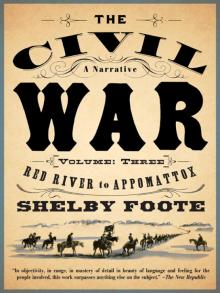 The Civil War: A Narrative: Volume 3: Red River to Appomattox
The Civil War: A Narrative: Volume 3: Red River to Appomattox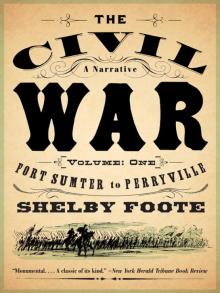 The Civil War: A Narrative: Volume 1: Fort Sumter to Perryville
The Civil War: A Narrative: Volume 1: Fort Sumter to Perryville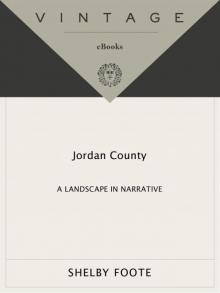 Jordan County
Jordan County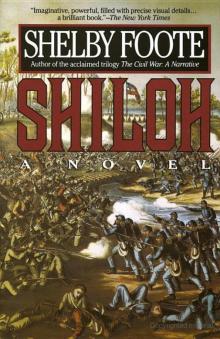 Shiloh
Shiloh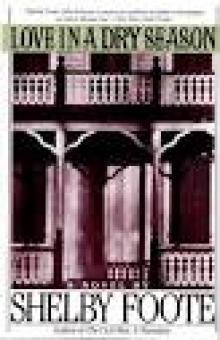 Love in a Dry Season
Love in a Dry Season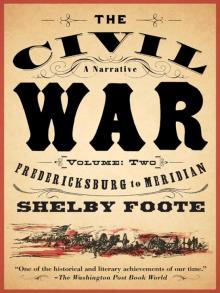 The Civil War: A Narrative: Volume 2: Fredericksburg to Meridian
The Civil War: A Narrative: Volume 2: Fredericksburg to Meridian Chickamauga
Chickamauga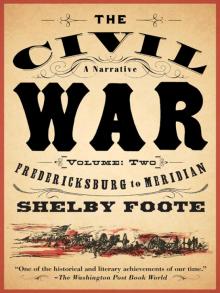 The Civil War: A Narrative: Fredericksburg to Meridian
The Civil War: A Narrative: Fredericksburg to Meridian